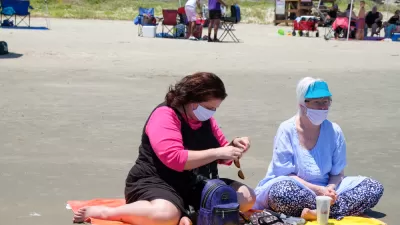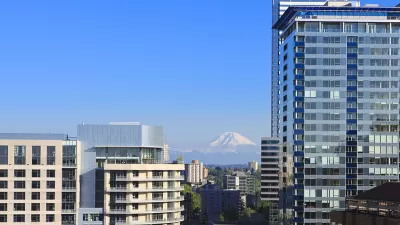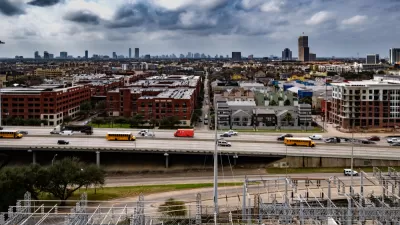Nate Berg uncovers yet another study matching long commutes to poor health, from low fitness to high blood pressure.
We've written about this before. But researchers in Texas have yet another study to add to the overwhelming body of evidence linking long daily car trips to indicators of poor health.
The study, to be published in the June issue of the American Journal of Preventive Medicine, followed 4,297 commuters throughout Dallas-Fort Worth and Austin, Texas. Not only did those with long commutes score worse on objective measures of health, they "reported doing less physical activity overall," Berg explains.
"And even when the researchers adjusted for each person's physical activity habits and cardiorespiratory fitness, both waistlines and body mass index increased right along with commute distance. Higher blood pressure was observed in commuters driving 10 miles or more to work. Those driving more than 15 miles each way were less likely to meet recommendations for 'moderate to vigorous' physical activity and were more likely to be obese."
Berg points out that the path of scientific inquiry doesn't end there. "The authors note that future studies would be needed to fully understand whether and how sedentary time during commuting affects health. For example, how is sitting in a car for an hour on your way to work different from sitting in your chair for an hour when you're at work? Or sitting on your couch? Or, instead of sitting in a driver's seat, sitting in a bus seat?"
FULL STORY: Longer Commute, Bigger Waistline

Maui's Vacation Rental Debate Turns Ugly
Verbal attacks, misinformation campaigns and fistfights plague a high-stakes debate to convert thousands of vacation rentals into long-term housing.

Planetizen Federal Action Tracker
A weekly monitor of how Trump’s orders and actions are impacting planners and planning in America.

In Urban Planning, AI Prompting Could be the New Design Thinking
Creativity has long been key to great urban design. What if we see AI as our new creative partner?

Portland Raises Parking Fees to Pay for Street Maintenance
The city is struggling to bridge a massive budget gap at the Bureau of Transportation, which largely depleted its reserves during the Civd-19 pandemic.

Spokane Mayor Introduces Housing Reforms Package
Mayor Lisa Brown’s proposals include deferring or waiving some development fees to encourage more affordable housing development.

Houston Mayor Kills Another Bike Lane
The mayor rejected a proposed bike lane in the Montrose district in keeping with his pledge to maintain car lanes.
Urban Design for Planners 1: Software Tools
This six-course series explores essential urban design concepts using open source software and equips planners with the tools they need to participate fully in the urban design process.
Planning for Universal Design
Learn the tools for implementing Universal Design in planning regulations.
Gallatin County Department of Planning & Community Development
Heyer Gruel & Associates PA
JM Goldson LLC
City of Camden Redevelopment Agency
City of Astoria
Transportation Research & Education Center (TREC) at Portland State University
Jefferson Parish Government
Camden Redevelopment Agency
City of Claremont





























